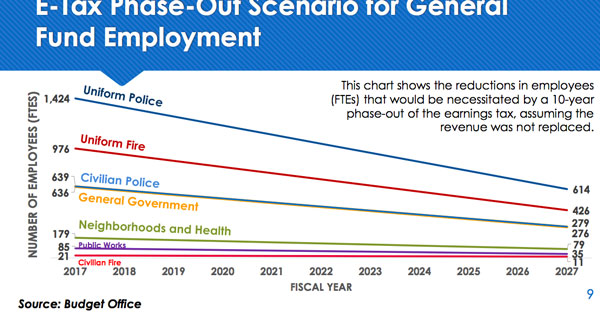 The city earnings tax, the leading single source of city revenue, is under threat from Jefferson City conservatives and the city is at political war.
The city earnings tax, the leading single source of city revenue, is under threat from Jefferson City conservatives and the city is at political war.
Kansas City and St. Louis, which also has the tax, angered state Sen. Kurt Schaefer by passing minimum wage increases (wiped out by state law), and the Columbia Republican introduced a bill to eliminate their earnings tax by 2017.
Backed by rich conservative donor Rex Sinquefield, Schaefer contends the tax is dysfunctional and unconstitutional under a U.S. Supreme Court ruling this year.
James said in a Wednesday media release with civic leaders that the court ruling does not apply to Kansas City.
The May ruling, he said, found a Baltimore tax unconstitutional on interstate commerce grounds because it did not grant full credit to residents who also pay income taxes in states where they work.
Kansas City allows residents a credit for local earnings taxes paid to other cities, the release states, and the ruling does not apply.
Jim Heeter, president of the Greater Kansas City Chamber of Commerce, said, “Sen. Schaefer’s action is wrong-headed and mean-spirited.”
John Sherman, chair of the Civic Council of Greater Kansas City, said, “The earnings tax is a critical component of a balanced set of revenues that funds basic city services relied upon by the community as well as individual citizens.”
This is not the first attack on the tax. In 2010, Sinquefield funded a statewide ballot measure that required the tax to be reapproved by Kansas City and St. Louis voters every five years.
Kansas City voters overwhelmingly renewed it in 2011, and the next vote is in April.
At a meeting this week, city officials reported that the tax that raises more than $230 million a year funds about 40 percent of the city general fund, which pays for police, firefighters and other public safety. About half the tax revenues come from people who live outside the city and use city services.
If city voters do not renew it, the tax would phase out over 10 years. The city would meanwhile have to gradually lay off hundreds of employees and/or raise painful taxes on city residents, officials said.
If the state bill passes next year, the tax would have to be eliminated in about a year.
James said, “We will be vigorously fighting this legislation in January.”



Trackbacks